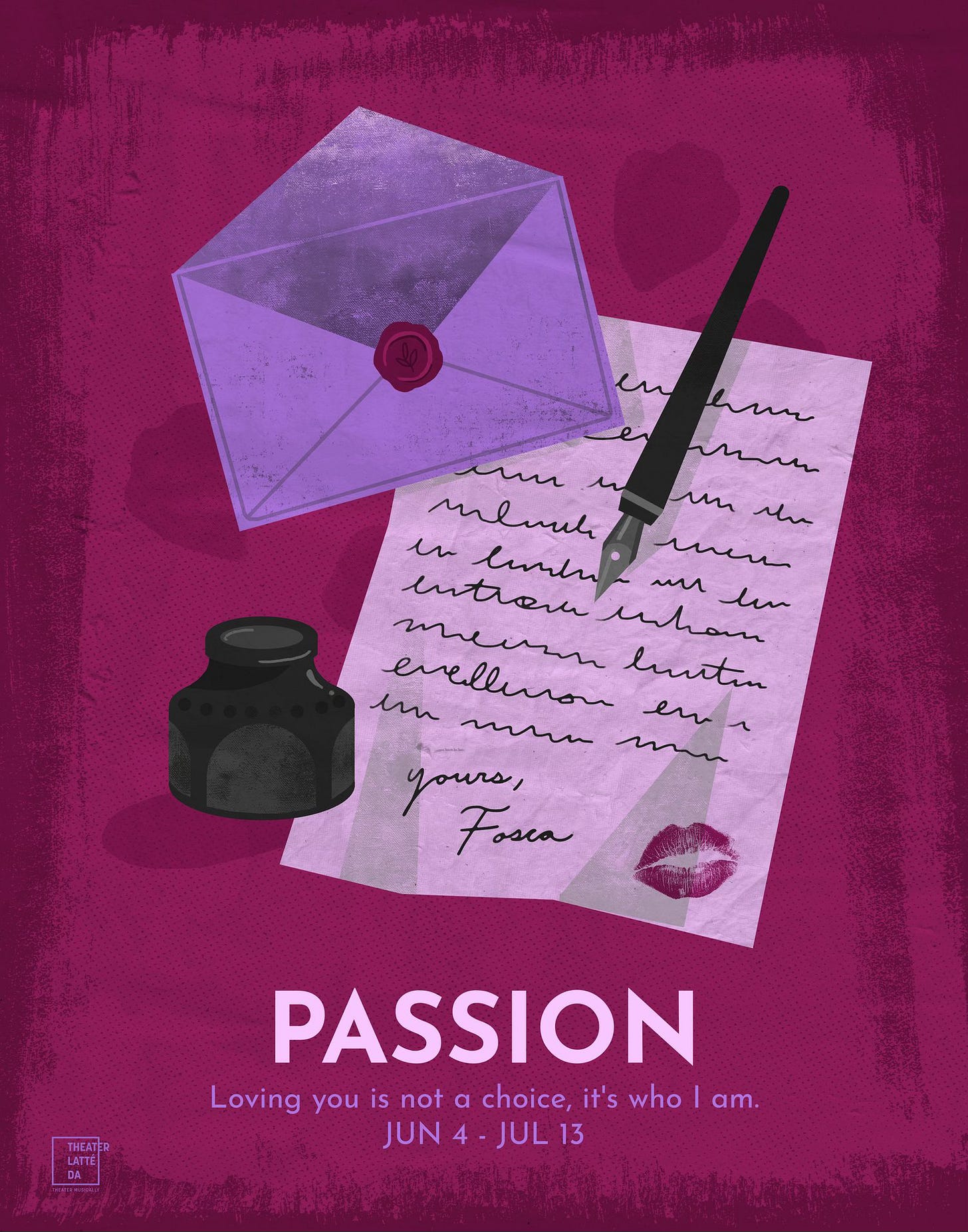Just before the lights dimmed, I asked my friend, “If you had to bet, what’s the reason Passion is one of Sondheim’s lesser-produced works?”
After all, this show has the esteemed honor of being the shortest-running show to ever win the Tony for Best Musical.
The answer? Passion is Sondheim’s genre piece, and that genre is…Victorian melodrama? And this work certainly has that classic Sondheim sound, instantly recognizable from the first number. Yet the story definitely feels like a novel or an opera. Does the musical format add anything? I’m not sure. It may not be a universal crowd-pleaser, but if it’s your cup of tea, Passion is a great watch.
I will register one qualm with the directing, and then move on to what’s good about this production—because there’s a lot of good to get to. In the program note, director Justin Lucero sets out to “reimagine” Passion as “less a linear tale than a psychological landscape.” Lucero views the play’s events as Giorgio’s unreliable memory, not strictly reality—a fascinating take on the work. High emotions, romantic letters, and diverging love stories make it ripe for subjective interpretation.
Folks, “reimagining” is perhaps my #1 director’s note red flag.
Even going in with knowledge of this vision, it’s remarkably absent from the show. The direction doesn’t build on the seeds of this concept that already exist in the piece. As my friend said, “I feel the show is actually extremely linear!” Perhaps the moving sheer curtains (enchanting set design by Erika Soukup) are meant to suggest this? But smooth set transitions are far too commonplace to read as shifting memories. Modern audiences are primed to view that as clever minimalist staging. It’s always disappointing when a program note promises more than it delivers. If they hadn’t mentioned this vision at all, I wouldn’t be griping about its absence.
While Passion doesn’t deliver on its intended vision, what it does deliver is a solid production from beginning to end. Erin Capello’s Fosca is deeply sympathetic while still firmly in the wrong, a complexity that is absolutely essential to the story’s balance. Bradley Greenwald as the doctor was a surprise favorite. His good-intentioned meddling is charming and brings occasional levity to a fairly sober piece. Dylan Frederick (Giorgio) has a lot of heavy lifting to do, and he carries it out effortlessly. We don’t see much of the military-men ensemble, but audiences will remember their barbershop harmony, a motif that brings a smile every time it pops up.
Costume designer Amber Brown pulls off one of my favorite tricks in the book with the contrast of Clara and Fosca’s dresses. Passion is set around 1863. Clara, when she’s wearing more than just her chemise, dons a brilliant pink satin dress, more reminiscent of later 1860s styles. The plainer Fosca wears a dark grey printed cotton, cut in a style about twenty years dated. In addition to the obvious color and texture differences, dressing Fosca in an older style gives her the feeling of having been left behind by the world. Even when audiences don’t consciously understand the difference, it reads clearly. For another great instance of this technique, see Emma (2020): Mrs. Elton’s obnoxious 1830s hair looks garish because it’s too fashion-forward for the pastoral early 1820s world of Highbury. This cute little bending of time period serves the costumes narratively.
Passion is an odd show, and it’s not for everyone—that’s why it’ll never be as popular as more universally-appealing works like Into the Woods. But it successfully wallows in its own melancholy world, building tension between Fosca and Giorgio that one knows must come to a head eventually. With artful set and costume design, and a great orchestra, more heady theatregoers might want to give this one a try.
Passion runs through July 13th at Theater Latté Da. Find more information here.


